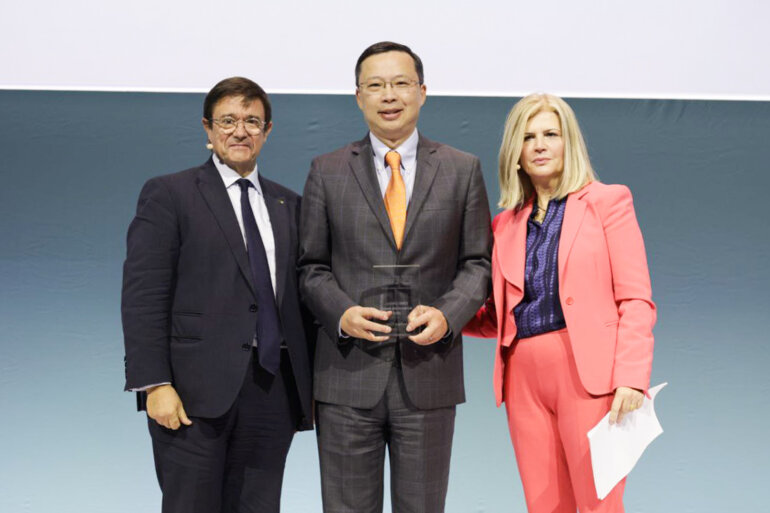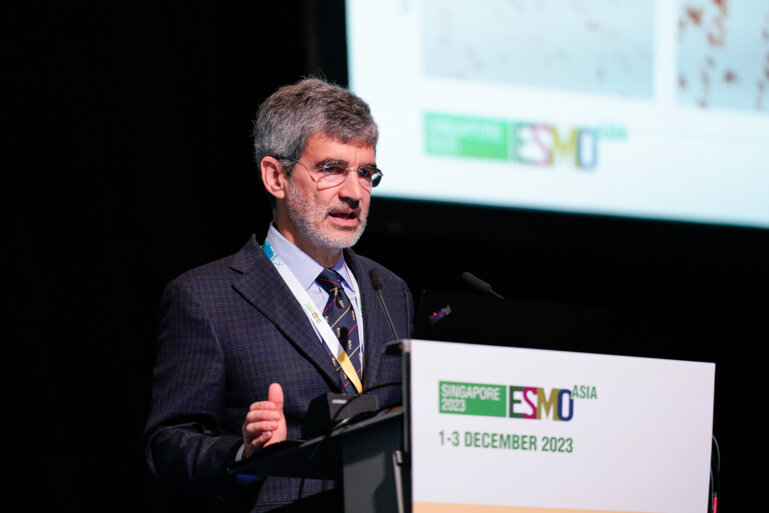Tailored management for high-risk locoregional disease, together with more effective immunotherapy combinations are key areas of exploration in nasopharyngeal cancer, according to 2023 ESMO Lifetime Achievement awardee Prof. Anthony Chan
At the ESMO Congress 2023 (Madrid, 20–24 October), Prof. Anthony Chan from The Chinese University of Hong Kong (CUHK), Hong Kong SAR, receives the ESMO Lifetime Achievement Award for his ground-breaking research in nasopharyngeal cancer (NPC), which started in the early 1990s and which has contributed to significant milestones being reached for a type of cancer that has the highest incidence rates in Asia.
How has the management of nasopharyngeal cancer changed since you began working in this area?
Almost three decades ago, NPC was a disease that was generally diagnosed by surgeons and then, due to its radiation-sensitive nature, managed by radiation oncologists. This approach achieved high rates of local control, but patients often failed with distant metastasis. The team at CUHK was very forward thinking at the time I joined as a young medical oncologist returning from the UK. Being an early adopter of multidisciplinary specialist care and research, our team was able to reap the benefits of this strategy for developing novel therapeutic and diagnostic advances in NPC. I am a firm believer that this multidisciplinary, collaborative approach is a key driver of the incredible improvements we have seen over time in the management of NPC and the outlook for patients. Today, chemotherapy and immunotherapy have expanded the available treatment options and we also have an effective biomarker to help quantify risk and allocate appropriate treatment.
What do you think are your key contributions to progress in the management of this tumour type?
We have always known that NPC is very sensitive to chemotherapy and studies in other head and neck cancers had shown the promise of concurrent chemotherapy and radiotherapy (CRT) to improve local and distant disease control. However, data in NPC had been lacking for a long time. From 1995 to 2000, I led a multicentre, randomised controlled trial in locoregionally advanced NPC, which demonstrated that the addition of concurrent cisplatin to radiotherapy (RT) increased 5-year survival rates from 59% to 70% compared with RT alone. This trial resulted in the adoption of concurrent CRT as the standard of care in this part of the world.
The challenge was then to further improve on the efficacy achieved with cisplatin-based CRT. Adjuvant chemotherapy had demonstrated mixed results in other head and neck cancers; it was also not an attractive proposition for patients having undergone the rigours of CRT. Instead, we were keen to explore chemotherapy in the neoadjuvant setting. A trial my team conducted in the 2000s provided randomised data supporting the efficacy of neoadjuvant chemotherapy in locoregionally advanced NPC (J Clin Oncol. 2009;27:242–249) and it dispelled concerns that delaying CRT to allow for several cycles of neoadjuvant chemotherapy would compromise outcomes. Since 2019, incorporation of neoadjuvant chemotherapy has been standard treatment practice.
Another major contribution to the management of NPC was made in collaboration with my colleague, Prof. Y.M. Dennis Lo. We identified non-invasively derived Epstein-Barr virus (EBV) DNA to be a highly sensitive, specific and quantitative marker of NPC tumour burden (Cancer Res. 1999;59:1188–1191). This biomarker is highly correlated with tumour stage and is now used clinically in both diagnosis and monitoring response to treatment. We went on to confirm that post-treatment residual EBV DNA is the strongest predictor of subsequent disease relapse (J Natl Cancer Inst. 2002;94:1614–1619; J Clin Oncol. 2018;JCO2018777847). We also developed and validated a risk stratification tool, integrating plasma EBV DNA data with TNM stage for patients undergoing adjuvant therapy (Ann Oncol. 2020;31:769–779).
What are the most important next steps in research in this area?
One of the most pressing needs is to find ways to effectively guide treatment for high-risk patients with post-treatment residual EBV DNA and this is the focus of an international effort (NRG-HN001). The trial is also investigating whether patients who have no residual EBV DNA after treatment can be spared adjuvant chemotherapy, which, despite its disputed benefits, is still used widely around the world. The results from this study are expected in the next few years.
What treatment developments lie ahead for nasopharyngeal cancer?
Immunotherapy is still a very hot topic, despite the fact that evidence of its benefit is lagging behind other tumour types, due to the chemosensitive nature of NPC. In a head-to-head comparison we conducted in platinum-resistant, recurrent/metastatic NPC (Ann Oncol. 2023;34:251–261), pembrolizumab showed no improved efficacy over chemotherapy, but the PD-1 inhibitor was better tolerated, and these agents are included as an option in treatment guidelines. Building on this, research from our group and others is now focusing on finding more active combinations of different immunotherapeutic agents. In addition, unlike in some other tumours, PD-L1 has not proven to be an effective predictive marker and so the search is on for alternative biomarkers that will enable immunotherapy to be tailored to the individual patient. Finally, NPC vaccines and targeting EBV in the therapeutic setting may hold some promise, but these approaches need to be further investigated and are still some way off from the clinic.








